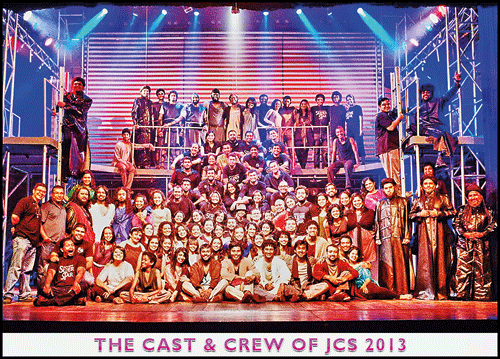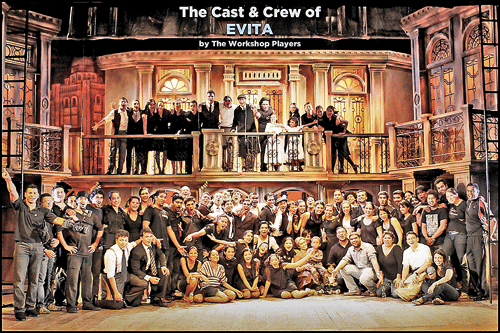Hats off to Jerome and WSP
Ididn’t give it three months at the start,” says Jerome L. De Silva, commenting on how he didn’t envision that the Workshop Players would grow into what it is today, when he began the group 25 years ago. Initially conceived as a series of English drama workshops organized by St. Peter’s College for Colombo schools, the Workshop Players today have become synonymous with English theatre in Sri Lanka.
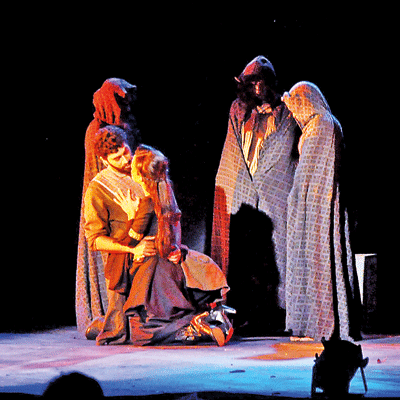
Expanding their horizons: The WSP production of 'Macbeth' at Ape Gama in March. Pic by Nlan Maligaspe
“It’s turned from just a name into a brand,” Jerome states matter-of-factly. With their own loyal following, it is somewhat ironic that the name itself was intended to be temporary until they came up with a better one. But no other name was ever put forward, and so it remained the Workshop Players.
In their 25th year, the Workshop Players are taking on the beloved musical ‘My Fair Lady’ and the production which goes on the boards at the Lionel Wendt from October 6-15 will see Jerome out of the director’s seat and up on stage playing Colonel Pickering. Veteran Workshopper Surein de S.Wijeyeratne takes his place as director. This will be the first time since 1994 that Jerome will be acting in a WSP production, and the first time his involvement in a production includes no directing but merely acting. This transition has been 17 years in the making as in 2000 Jerome was to take on the role of the Phantom in their ill-fated production of the Phantom of the Opera with Surein in the director’s seat.
It was through musical theatre – grand productions such as Oliver, Evita, Jesus Christ Superstar, Phantom of the Opera and Les Miserables over the years, that the WSP attracted the crowds and made a name for themselves. In fact it was with their musical production in 1994 that they first captured the attention of Colombo. For the longest of times that was what they were known for and perhaps they stuck to it as musicals meant that a larger cast was required allowing them to accommodate more people, and draw in the crowds. “Sri Lankan audiences like light-hearted musicals,” says Surein, the Assistant Artistic Director of WSP, noting how it was always easier to get the crowds for productions like Oliver than it was for ‘The Royal Hunt of the Sun’ which dealt with a heavier subject matter.
But in recent years the WSP have been moving back into serious theatre with Shakespearan productions, and dark dramas like ‘A View from the Bridge’ and ‘A Streetcar named Desire’, and surprisingly Sri Lankan audiences have responded well. Perhaps it’s due to the following that WSP have achieved over the years, or perhaps it was a misconception on their part of what audiences wanted, admits Jerome, noting that English theatre- goers aren’t a monolithic group but diverse in their tastes.
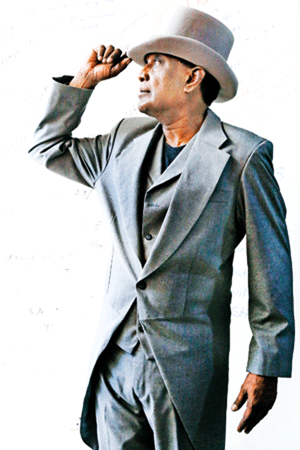
Back on stage: Jerome De Silva preparing for his role in ‘My Fair Lady’. Pic by M.A. Pushpa Kumara
This move towards serious theatre was actually motivated by the need to help school children studying literature. At the behest of his friends teaching literature, Jerome and the WSP took the intiative to stage Othello and Macbeth, the Shakespearean plays studied under the O’Level and A’Level curriculum as well as A Streetcar named Desire and A View from the Bridge, that were all part of the school syllabus at the time. The response was positive from both students and schools.
One of the more notable contributions the WSP have made to theatre in the country is the introduction of the concept of free public performances of Shakespeare’s plays. Though written for the masses, for centuries an air of elitism has surrounded the famed playwright’s works. Factors such as seating numbers and ticket prices have restricted the greater public’s access to theatre. Modelled on the famous ‘Shakespeare in the Park’ productions that take place in New York City’s Central Park, the Workshop Players put on productions of Othello, A Midsummer Night’s Dream and the Merchant in Venice at the Viharamahadevi park amphitheatre in Colombo in 2016. The WSP anticipated about 200 attendees, but were soon surprised at the response when over 700 braved the rains at the open air theatre to watch the free production. This year, true to the Shakespearean words ‘all the world’s a stage’ they extended the concept to “Shakespeare in the Village” when they held their production of Macbeth at Ape Gama in Battaramulla. Jerome was happy to note that schools understanding the value these productions have for their students made it compulsory for those sitting literature exams to attend.
Twenty- five years on, we tend to forget that they are a group of amateurs, essentially theatre enthusiasts, bound together by their love of theatre which shines through in their performances. But the experience of the audience is also of concern to them, with great pains taken to ensure a good performance, even when it isn’t financially feasible. In a bid to upgrade their skills, members of the core team travel abroad to catch performances on Broadway and in Australia. “We watch the plays, go on backstage tours to learn from them. What better way to learn the techniques than to speak to those who’ve done it,” explains Reihan Stephen, secretary of the WSP organizing committee.
This clearly has paid off as over the years the Players who initially outsourced things like stage management and lighting, have now become self-sufficient, pulling in resources from within their membership that numbers over a 1,000. “From sounds, to lighting, to costume designs and makeup, the team does it all,” Shanuki De Alwis, the Assistant Artistic Director of the WSP, proudly proclaims. “It’s not just about the performances but keeping the theatre alive,” says Surein, explaining how even if they are losing money on a production they’ll willingly do so to ensure that quality and standards are maintained.
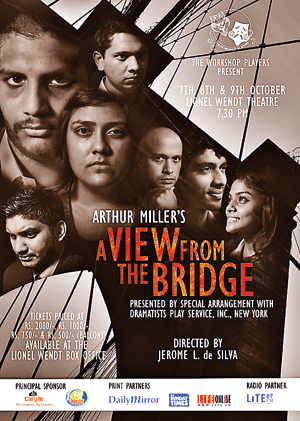
A journey of 25 years: Posters from past productions. (above and below)
Having built a community, the WSP understand the need to give a voice to socially relevant topics, as well as empower people by helping them find their own voice. They chose to promote inter-racial harmony, facilitate post-war reconciliation and teach English to underprivileged children through the medium of drama and theatre. “It’s a humbling experience when you see the impact of these workshops,” says Reihan.
This year to mark their 25th anniversary and stay true to their roots the WSP organized a series of free workshops for all those interested in learning the craft, from those as young as 8 to those well into adulthood. Jerome, who never had formal training himself, uses this as an opportunity to give back and pass on his knowledge to the next generation.
Jerome is also passing the mantle. Having initially handled all the creative aspects of the production, from directing to lighting to choreography, Jerome has been slowly but surely letting go. As early as 2007, during their adaptation of Blood Brothers, assistant directors became involved in the productions. Currently Shanuki and Surein are the Assistant Artistic Directors, with Shanuki also taking charge of choreography and Surein being the musical director. The culmination of this process has been Jerome choosing to act and appointing Surein as the director of My Fair Lady.
Jerome believes that control of the WSP should be handed over to the next generation. “Like a family it will move from generation to generation,” he says, stating that he was the first generation and with the second being those currently acting, the third will be those young thespians still in training. It does seem like one large supportive family that is there for you at all times, even going so far as to organize each other’s weddings or taking up the burden of making funeral arrangements when a Workshop Player loses a loved one. And in true extended family style, with the WSP reaching their 25 year milestone, those members scattered around the world are due to make the journey back to celebrate it.
But no journey is without its obstacles and the WSP have had to face their share, the biggest being in 2000, when the carpet was pulled from under them on the opening night of their adaptation of Andrew Lloyd Webber’s Phantom of the Opera due to copyright issues. They’ve also found that their more controversial productions have next to no corporate backing – like their recent production of Jesus Christ Superstar.
The WSP may not be the first English theatre group in the country but it is the oldest in existence right now, and its future looks bright. Plans are underway to expand the WSP beyond the confines of our island, with hopes to conduct a series of theatre workshops in several other countries including Uganda, and to send members of the WSP to theatre festivals around the world. Perhaps in the future the WSP can look back at their 25th anniversary and see it as a start for all the great things they will hopefully achieve.
| “My Fair Lady” goes on the boards from October 6- 15 at the Lionel Wendt Theatre. Tickets priced at Rs. 5000, 4000, 3500,2000,800 are available at the Lionel Wendt Theatre. My Fair Lady is brought to you by the principal sponsor Cargills and co-sponsor Cargills Magic. | |
